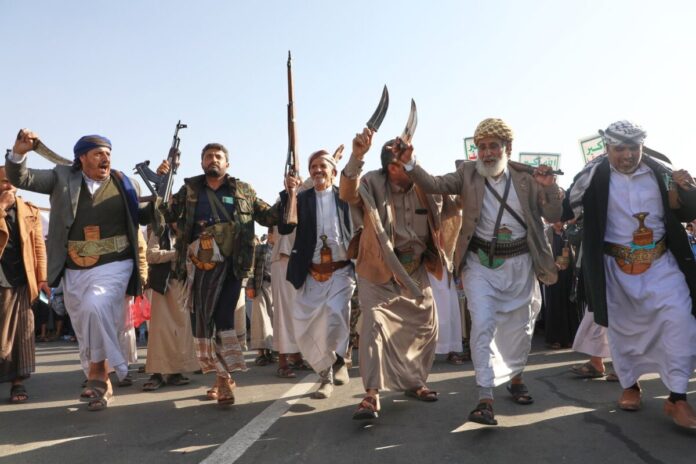A coordinated raid in Yemen’s capital leads to the capture of twenty UN staff, including the British head of Unicef. The silence from Western capitals speaks louder than words.
The UN Taken Hostage in Broad Daylight
Houthis detain UN employees, a blunt headline, but one that barely captures the symbolic magnitude of what took place this weekend in Sanaa. On Saturday, armed Houthi forces stormed a United Nations compound in the Yemeni capital, taking twenty UN personnel into custody. Among them: Peter Hawkins, the British national heading Unicef’s mission in the country.
The detained include fifteen international staff and five local employees. This was no random sweep, but a targeted operation. Jean Alam, spokesperson for the UN Resident Coordinator in Yemen, confirmed the figures and added that eleven other Yemeni workers were released after interrogation, a detail suggesting a systematic screening of individuals, possibly based on nationality, affiliations, or intelligence value.
Espionage Allegations Reignite Cold War Echoes
The Houthis have not remained vague in their justification. Quite the opposite. In a televised speech on Thursday, their leader Abdelmalek al-Houthi openly accused the detained personnel of belonging to “one of the most dangerous espionage cells” allegedly working for the United States and Israel. The organisations under suspicion? The World Food Programme and Unicef.
To dismiss these accusations as mere propaganda would be convenient. But the geopolitical terrain says otherwise. In a theatre of war where formal embassies have long ceased to function, humanitarian organisations are the last visible Western presence. This alone is enough to feed suspicions, real or manufactured, of covert operations cloaked in aid missions.
Indeed, this is not the first such incident. On August 31, the same Houthi militias raided another UN office in Sanaa, detaining around ten employees. The message seems consistent: international neutrality is no longer recognised, or respected, on Houthi-controlled soil.
UN’s Diplomatic Language Falls Short
Faced with such a grave affront, the reaction from UN headquarters was tepid, if not perfunctory. Stéphane Dujarric, spokesperson for the UN Secretary-General, issued a statement on Saturday describing the accusations as “dangerous and unacceptable” and warning they “put at risk the safety of UN personnel and humanitarian workers, and jeopardise vital aid operations.”
Strong words on paper. But in the theatre of power politics, such bureaucratic phrasing rings hollow. The core issue is that the United Nations, and by extension the Western diplomatic apparatus, is increasingly perceived as toothless in regions like Yemen — where military clout, not legal mandates, dictate the rules of engagement.
And what of the usual Western powers? Washington, London, and Brussels have offered little more than silence. Perhaps because confronting the Houthis would risk exposing the deeper failure: a decade-long policy of disengagement, substitution of diplomacy with sanctions, and a reliance on non-state actors that now seems to have backfired.
A Power Vacuum the Houthis Are Willing to Fill
The truth is hard to ignore: Yemen has turned into a zone where sovereignty has collapsed and soft power has been reduced to a collection of logos on bullet-riddled compounds. Western aid workers, once shielded by diplomatic immunity, are now bargaining chips in a war their own governments no longer try to understand — let alone win.
The Houthis, backed by Tehran, understand this better than most. With Saudi Arabia pulling back and Washington focused on Gaza and Ukraine, the Yemeni insurgents have found the perfect window to redefine the rules. Targeting Unicef is not an accident — it’s a statement.
The UN’s Authority Is Now on Trial
That the Houthis detain UN employees is now beyond dispute. That they do so publicly, and justify it with rhetoric echoing Cold War paranoia, is a challenge to the international order. But the most damning fact is this: no one seems ready to respond.
As the UN clings to its fading neutrality and Western capitals look the other way, Sanaa becomes a laboratory for a dangerous precedent — where aid workers become suspects, and humanitarian logos offer no protection. The West’s absence is not just strategic. It’s moral. And it may be irreversible.



